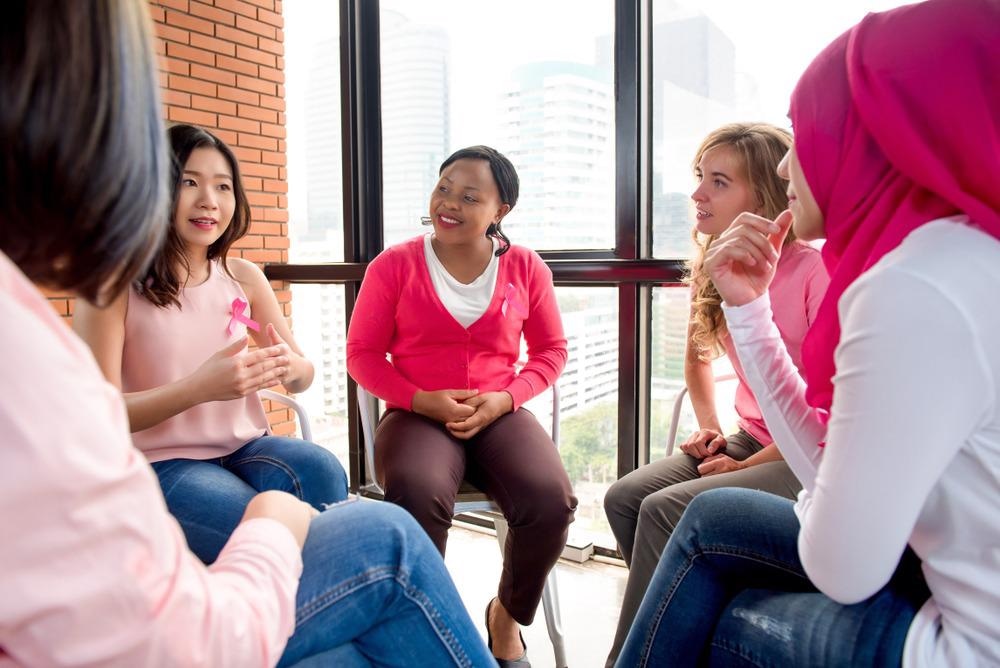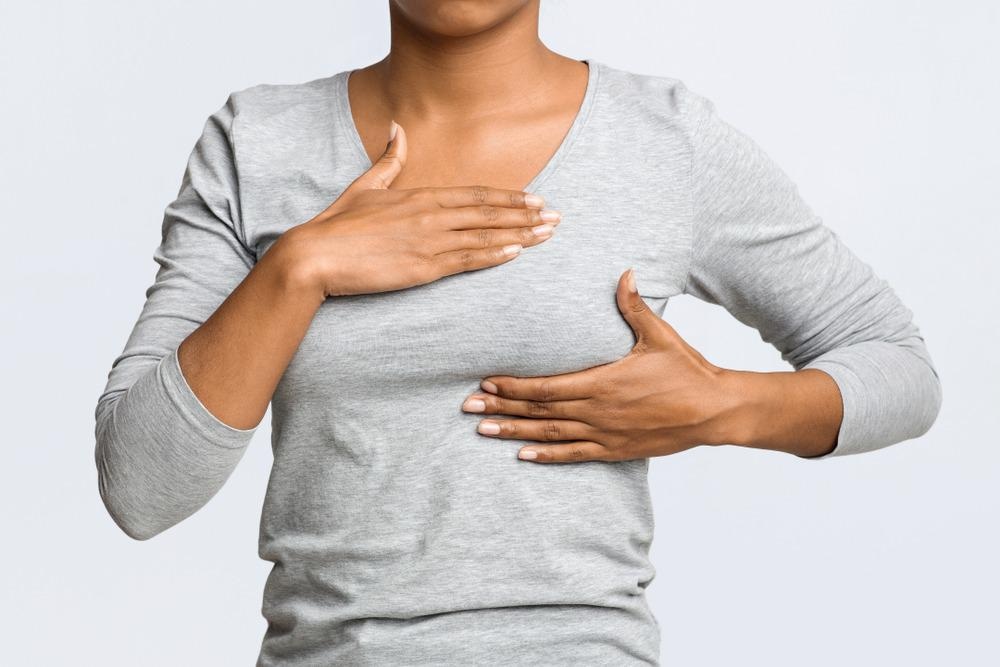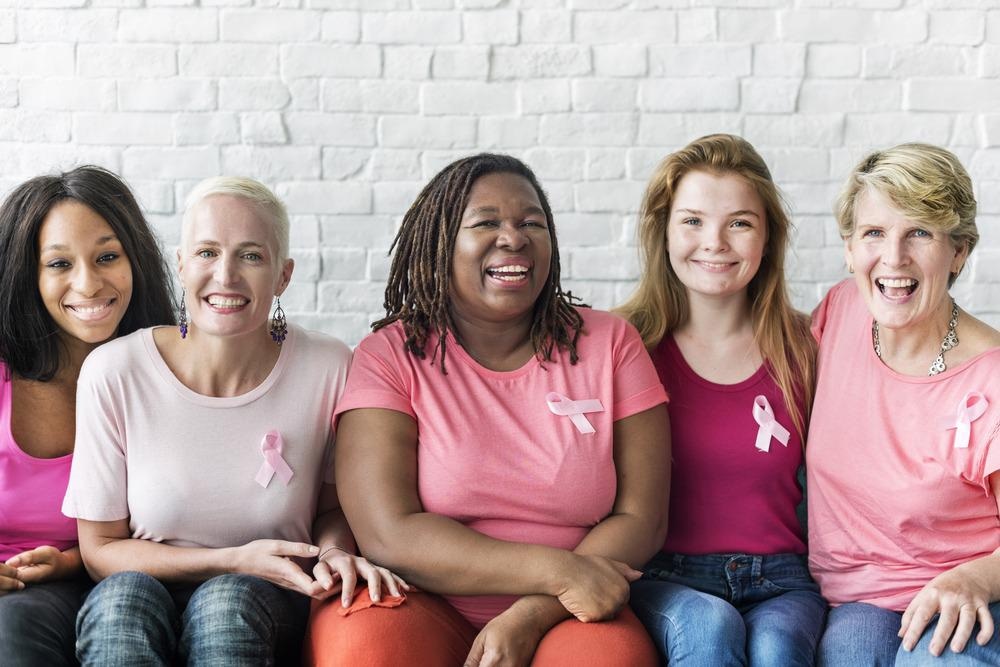I’m Simon Vincent, Director of Research, Support, and Influencing at Breast Cancer Now.
My team manages the world-class breast cancer research the charity funds, supporting our 340 researchers who are among the brightest minds in UK science. All our new research funding undergoes a thorough review process, carried out by independent experts from around the world. Part of my job is to work with our scientific advisors and patient advocates to make sure that we choose the best possible research, which is going to have the biggest possible impact on people affected by breast cancer.
My team also manages the Breast Cancer Now Tissue Bank, which is the UK’s largest unique collection of high-quality breast tissue, breast cells, and blood samples from breast cancer patients. By giving researchers access to study this tissue, we’re driving progress and breakthroughs and bringing hope to patients for the future.
As well as this, I oversee our policy, influencing and campaigning work championing the needs of people with breast cancer, and head up our support services for cancer patients including our nurse-led Helpline, Ask our Nurse email service, and online forum.
Breast Cancer Now is a research and care charity ‘steered by world-class research and powered by life-changing care’. Can you tell us more about some of the missions at Breast Cancer Now and how you are trying to achieve them?
Breast Cancer Now’s vision is that by 2050 anyone diagnosed with breast cancer will live and be supported to live well. While breast cancer survival rates have doubled in the UK in the last 40 years, more people than ever are being diagnosed every year. Unless we act decisively to reset the dial, the number will continue to rise and many thousands will continue to lose their lives to the disease.
Our mission is to turn the tide on breast cancer, which is why we’re committed to tackling secondary breast cancer, providing better support and services for those affected, developing kinder, smarter treatments, improving detection and diagnosis of the disease, and, where possible, preventing breast cancer.
For the last 15 years, Breast Cancer Now, working alongside our amazing supporters, has been campaigning for data on secondary breast cancer to be collected. Secondary breast cancer is when breast cancer has spread to another area of the body, where it can be treated but no longer cured. It’s estimated that around 35,000 people are living with secondary breast cancer in the UK, but we don’t have an accurate, up-to-date figure. Without an audit, nobody knows how many people are currently living with secondary breast cancer in the UK. Thanks to our campaigning, in 2021, NHS England and the Welsh Government announced that they would commission an audit on secondary breast cancer, which will start in Autumn 2022. We’re looking to secure similar commitments in Scotland and Northern Ireland, and we are determined to see broader improvements in data collection on secondary breast cancer across the UK.
We are the only UK charity that inputs into all breast cancer drug appraisals (primary and secondary) by the National Institute for Health and Care Excellence (NICE) and the Scottish Medicines Consortium (SMC). We have worked continuously to influence a significant review into the way that NICE assesses drugs for use on the NHS to ensure new clinically-effective drugs can be recommended for use as quickly as possible for all eligible women, at a fair price for the NHS.
On top of the physical changes, there are mental challenges for people affected by breast cancer, which is why Breast Cancer Now wants to ensure that anyone diagnosed with breast cancer receives a swift and personalized referral to our services. The care we provide through our Helpline and other support services helps people make informed decisions about their treatment and care and gives them the chance to share their experiences and hear from experts, in a supportive environment.
We are Breast Cancer Now
You fund over 340 researchers who are working within breast cancer research. What types of research are being carried out on breast cancer and how critical is funding to research?
At Breast Cancer Now we take a ‘bench to bedside’ approach with the research we fund to get discoveries in the lab to patients as quickly as possible, and we support discovery research to increase our understanding of the disease and accelerate drug development. Right now, we’re funding over 80 cutting-edge projects worth just over £26 million to discover how we can save lives and help people to live well with and beyond breast cancer.
Ultimately, through research, we want to stop people from dying from breast cancer. Our researchers are trying to understand why breast cancer spreads to other parts of the body where it becomes incurable and what can be done to stop it or treat it more effectively. Outstanding work carried out over the last 20 years by world-class researchers - including many UK researchers funded by Breast Cancer Now – has uncovered weaknesses in breast cancer cells and laid the foundations for a new treatment for women with breast cancer caused by an altered BRCA1 or BRCA2 gene.
Our researchers are working to develop kinder breast cancer treatments that don’t come with devastating side effects and to identify better ways to detect and diagnose the disease. Dr. Kastytis Sidlauskas at Barts Cancer Institute was one of the recipients of the Breast Cancer Now Dame Vera Lynn Translational Research Fellowship last year. He is using artificial intelligence to develop a better way to know how likely ductal carcinoma in situ (DCIS) is to become invasive breast cancer. This research has the potential to change how DCIS is treated by allowing some people to safely skip treatment while making sure those who need treatment receive it and their DCIS doesn’t come back as invasive breast cancer.
We’re also funding research into breast cancer prevention. We know that at least 1 in 4 breast cancers could be prevented and we want to find better ways to do this. But first, we need to know who is most at risk of breast cancer and what we can do to prevent them from developing the disease. At present, we don’t know why one woman will develop the disease while another won’t. The Breast Cancer Now Generations Study, set up in 2004, is helping us to understand the causes of breast cancer by following over 113,000 UK women for 40 years, and this will help us understand who may be more likely to develop the disease and what we could do to prevent it.
As well as conducting world-class research, you also offer support for anyone that is affected by breast cancer. How important is offering support to these individuals and what types of support services do you offer?
We offer tailored support services and specialist information, for anyone affected by breast cancer and anyone with questions about breast health. This support has been needed more than ever over the past two years due to the impacts of the pandemic, and while we had to pause face-to-face meetings we rapidly pivoted our services online to ensure we continued to be there for anyone who needed us. We are delighted that our face-to-face services are starting up again now across the UK.
People who are concerned about breast health, diagnosis, treatment, or life after treatment must have somewhere they can turn to, which is why we have a free, confidential Helpline (0808 800 6000) and Ask Our Nurses email service which is staffed by our expert breast care nurses.
Our wide-ranging support services are a lifeline for thousands of people affected by breast cancer.
Our ‘Younger Women Together’ service gives women aged up to 45 the opportunity to join small groups online to meet with women who understand what they’re going through and hear from experts on issues including treatment, fertility, exercise, and mental health.
For many, talking to someone who’s also been through a breast cancer diagnosis and treatment can be a helpful part of ongoing recovery, which is why 'Someone Like Me' is so crucial. The service matches people with trained volunteers who’ve had similar experiences to them, to answer questions, offer support or simply listen.
As well as our group services, through Breast Cancer Now’s online discussion Forum, people can reach out to our supportive community at any time of day or night.

Image Credit: Atstock Productions/Shutterstock.com
In light of recent years, it has never been more important to ensure medical information is accurate and reliable. How important is ensuring that patients have access to accurate information on your site?
For us, it’s crucial that we’re communicating everything to our supporters clearly and accurately. In this day and age with so much misinformation and ‘fake news’, it can be hard to distinguish what is reliable health information from what is not.
Access to reliable medical information is vital in helping people to make decisions about their care and treatment. Having the right information can really empower people at a time when they may feel they don’t have control over what is happening to them. The information provided to them needs to be evidence-based and balanced. That’s why Breast Cancer Now is a member of The Patient Information Forum (PIF) - an independent organization that promotes the need for good quality health information.
At Breast Cancer Now our patient information is written by our clinical specialists and reviewed by both healthcare professionals and people affected by breast cancer to ensure its gold standard. We’ve been accredited by PIF as a trustworthy information provider and our website carries the PIF TICK which is a quality mark for healthcare information.
Despite the vast amount of information surrounding breast cancer, many people still get a late diagnosis due to them overlooking atypical symptoms. Education is key in helping people to understand all symptoms of breast cancer, not just typically observed ones. How are you trying to improve people’s understanding of breast cancer?
Early detection is a critical first step to preventing women from dying from breast cancer. It’s vital that women check their breasts regularly and report any new or unusual breast changes to their GP – while in most cases it won’t be cancer, when it is, the sooner it’s diagnosed the more likely treatment is to be successful.
We’re committed to improving access, support, and care for anyone affected by breast cancer and deliver public health talks in workplaces and community groups across the UK. Working with corporate and fundraising partners like Asda’s Tickled Pink campaign also helps us to amplify breast health awareness to wide audiences.
Our breast awareness information is available in multiple languages such as Arabic, Cantonese, Hindi, Polish, Punjabi, and Urdu. We have also recently commissioned research to identify barriers and challenges to raising breast health awareness among ethnically diverse groups.
Education is key, but it’s not only about knowing the signs and symptoms of breast cancer, it’s also about knowing what people can do to reduce their breast cancer risk. Many different factors, from genes to lifestyle, can influence someone’s chance of developing breast cancer. We’re gathering invaluable insight through research, such as our Generations Study (mentioned earlier), to investigate how lifestyle choices and environmental factors come together to change breast cancer risk and how we can use this knowledge to reduce risk.
As we learn more about which interventions do and don’t work, whether that’s lifestyle changes or risk-reducing surgery, or drugs, we want to share our knowledge to help more women understand and take action to reduce their risk.
The ongoing COVID-19 pandemic has highlighted the importance of collaboration and innovation in research. How important is collaboration and innovation to Breast Cancer Now?
The pandemic has shown us what can be achieved in science when innovation and collaboration are embraced to accelerate progress in medicine – the COVID-19 vaccine being an inspiring example. Breast cancer research has a critical role to play now in helping us to ensure the best possible outcomes for women with breast cancer in future years and collaboration is key to this progress.
In 2016, we launched the Breast Cancer Now Catalyst Programme aiming to accelerate breast cancer research through collaboration. Currently, the program is supported by Pfizer, who has provided Breast Cancer Now with $15 million (approximately £10m) funding through an independent medical research grant and given our researchers access to several Pfizer medicines, which has enabled Breast Cancer Now to conduct research that it simply could not do alone.
Like many of our peers in the charity sector, our fundraising income took a hit in the pandemic and many of our labs were temporarily closed due to restrictions. As we emerge from the pandemic we must continue to turn the tide for breast cancer patients, by investing in scientific research and working together to find innovative ways to accelerate progress towards a time when people no longer die from this devastating disease. We can’t do this alone and collaboration – between charities, industries, medical professionals, and people who can share their lived experiences of the disease – is vital to ensure we develop new therapies and treatments for people with breast cancer more quickly.

Image Credit: Prostock-studio/Shutterstock.com
Are there any upcoming exciting projects that you are involved in at Breast Cancer Now? If so, what are they?
I’m excited about all our research, especially when I look back at what we have achieved for breast cancer patients in the last 30 years and look ahead to where we want to be by 2050.
When the pandemic hit, we like many of our peers were concerned about the research we would be able to fund in the future, but thanks to the incredible support and fundraising by the public and our partners, we know that our research funding is secure. We can’t wait to share details of our new research projects starting across the UK soon.
We are also pleased to announce the reopening of our project grant and Ph.D. studentship applications, which will close in May 2022. We invite applications from researchers studying any aspect of breast cancer.
Throughout your role at Breast Cancer Now, what has been your proudest career achievement?
Seeing our researchers deliver trial results that make an immediate difference in the treatments breast cancer patients receive is one of the most rewarding parts of my job.
Breast Cancer Now co-funded the Triple Negative Trial which was set up to investigate whether women with triple-negative breast cancer, whose cancer has spread, would be better off receiving a chemotherapy drug called carboplatin, rather than the standard chemotherapy.
Nearly 400 women from across the UK took part in the Triple Negative Trial which discovered that for women who carry an altered BRCA gene and have secondary triple-negative breast cancer, 68% of participants saw their cancer shrink in response to carboplatin. Carboplatin also delayed the progression of the disease by 6.8 months, compared to 4.4 months on standard chemotherapy.
In direct response to the trial’s results, the European Society of Medical Oncology made changes to its guidelines for doctors for the treatment of secondary breast cancer. Crucially, the guidelines also now recommend that women with triple-negative secondary breast cancer are offered BRCA gene testing, to identify more women who could benefit from platinum chemotherapy- which I’m proud to say would not have happened without this research.
One of my proudest achievements at Breast Cancer Now has been my team creating and implementing The Breast Cancer Now Catalyst Programme to promote collaboration in the UK and across Europe in breast cancer research. With 28 exciting breast cancer research projects being funded through this Programme, I’m so proud that through this collaboration we are accelerating progress in world-class breast cancer research.
What do you believe the future of breast cancer to look like? Are you hopeful that with continued research, we will see a better future for people diagnosed with breast cancer?
Our ambition at Breast Cancer Now is that by 2050 everyone diagnosed with breast cancer will live and be supported to live well. To make this a reality we need to act now, and work towards that target every minute, every day.
We are hopeful that more progress will be made in breast cancer research in the next 30 years than at any previous time in our history. Research is helping us to know who in advance is at higher risk of breast cancer and helping us to find ways to prevent it.
In the future, we want everyone who develops breast cancer to be offered a personalized treatment plan with much kinder treatments. We want breast cancer to be caught earlier when it might be easier to treat and before it can spread around the body. Through research, we can ensure that when breast cancer does spread, we always have further treatment options, so if one treatment stops working we have alternatives. Research is the key to changing the future of breast cancer.

Image Credit: Rawpixel.com/Shutterstock.com
Where can readers find more information?
To find out more about our world-class breast cancer research, campaigning, and support services go to breastcancernow.org
About Dr. Simon Vincent
I have a Ph.D. in Genetics from Nottingham, and post-doctoral research experience gained at the Imperial Cancer Research Fund Laboratories in London. In 2000 I joined the Cancer Research Campaign and lived through the merger with the ICRF to form Cancer Research UK. I worked in a number of areas in Cancer Research UK, including leading the team that looked after the charity's fellowship funding. I spent a year at the Academy of Medical Sciences, where my team supported early-career biomedical researchers through mentoring, career support, policy development, and awarding grants.
In 2014, I joined Breakthrough Breast Cancer to lead the research team, before going through another charity merger to form Breast Cancer Now, where I become Director of Research. In 2019 I led the research team as we went through a further merger, with Breast Cancer Care.
I am now Director of Research, Support, and Influencing for Breast Cancer Now, and I oversee our research portfolio, our support services for cancer patients, our nurse-led helpline and health information, our policy and campaigning work, and our public health activities.